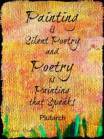Lynn M. Dixon's Blog, page 52
May 29, 2016
Budding Writers!
Have you ever been given the commission to lead some young-uns and put them on a higher path? Well, I recently had that task when I attempted to teach the beauty of the writing process to a group of middle-schoolers.
And now, as graduation tassels are being flipped and summer vacations are in view, I see smiles for miles. They are saying, “We did it!” And I graciously remind them that they are successful because they are good students and they followed my guidance. Simple enough!
They followed my voice. My intonations. My examples. My formats and formulas. And, yes. our frustrations did surface on some days.
They had to write in longhand. They had cramping fingers and often did finger exercises. And, yes, to their shock and dismay, they had to use ink pens.
Here are some of the orders that I barked out on a regular basis.
“Yes, use a pen with blue or black ink. No green, red, purple or any other color!”
“No! No pencils!”
“Pencils are for math.”
“No, do not scratch out words.”
“I have two bottles of white-out on my desk.”
Some days, the entire room smelled like white-out as they carefully painted across their errors. I laughed to myself, but they were learning to be meticulous and conscientious.
And, could they write all the way to the right end of the notebook paper?
“Hecky no!”
“There is a red line. Respect that margin!” my voice raised.
Will they ever forget the experience? Probably not. Because now they are begging to read their papers to the class.
Others are showing those who were absent how to write a perfect five-paragraph paper filled with discussions and supported by evidence from the text with page numbers.
This should get them through high school and college because they listened. And now, voila! We have a host of nouveaux auteurs or new writers! And who knows? There may be a few budding authors in our midst! Selah.

Lynn M. May 29, 2016


May 22, 2016
Open Windows!

There are so many lessons from our childhoods that guide us and encourage us to do the right thing. Prompters like The Golden Rule or turn the other cheek or Mother Teresa’s poem Anyway along with a host of other pointers, nudge us towards making good choices in life.
One of my favorite poems is If by Rudyard Kipling which reminds me to keep my head when everyone else is losing theirs and blaming it on me. Many lines have been written to help us to keep on forging ahead and remember that”when the going gets tough, the tough get going.” Winston Churchill, who saw two World Wars, penned, “If you are going through hell, keep going.”
All of those sayings have stood the test of time and are still true today. We must strive to maintain a level of peace and poise during the challenging times. When we get to the other side, there will be a light-filled zone and the occasion for a victory dance.
Good choices, silver linings, happy outcomes along with a good reputation will be intact. All of those wondrous things will show up to embrace us with loving arms of comfort. We simply must hold on and hold out and the fresh, open windows of opportunity will surely breeze our way.
Lynn M. May 22, 2016


May 15, 2016
#Am Writing!

Writers are often looking for good topics. They have to be keen observers of life and in a moment’s notice, they may have an aha moment. Something appears across their screens and the writing process begins.
Ideas flow and the fountain pours with speed. The moving hands can barely stay ahead of the race. There is a writing marathon which hopes to capture all that has been revealed.
I was looking at Author Sandra Cisneros speak on You Tube, from the Book Festival of 2012. She talked about never running out of material or things to write about because she reminded her audience that we live stories throughout the day.
That was such an interesting take on life because it holds true. She talked about stories being born every moment that we participate in this life. The real challenge for writers is to find the time to sit down and put the words on a page of paper.
Every encounter with another person is a potential story or vignette. Life lessons are being learned and experienced minute by minute. Small things such as chatting with a colleague at the local grocery story can easily turn into a story.
Every day offers several simple stories. Watching how others spend their time as they wait for their clothes to wash or dry at a laundromat could evolve into some mini tales.
Some may read or organize business papers while others tap out messages on their electronic devices; but with the addition of that creative touch, some truth may shine through in the form of a narrative.
It is the little things that people do on a daily basis that often pique the interest of readers. Afterall, emotions and responses are universal and many can identify as they also travel through this life.
The beauty lies in the fact that someone took the time to write it down or pen it. Thus, hearts are touched and snippets of everyday occurrences are shared.
Writers remind us that we are indeed alive and that each moment is filled with delightful little stories. Ernest Hemingway said it best when he said, “To write about life, you must live it!”
Lynn M. May 15, 2016


May 8, 2016
Good Reads!
What propels writers to pick up their pens? What have they seen, felt or heard that will not leave their spirits alone until it is scribbled out on a page?
When writers have that divine discontent or that restlessness to tell a tale, they have been known to use napkins, paper towels or any available paper. They must unleash that flow of words to capture those thoughts and feelings.
Those motifs refuse to stay dammed up or held back. So, they push their way forward while the scribes act as mere instruments used for expression.
Some stories must be told, shared or made visible to the human eye. They can be compared to a hefty sub sandwich bearing all of the outer wrappings before biting into the meat or main ingredient.
A plot unfolds after the characters and setting are introduced in quite in the same way that the crusted bread lays the foundation for a good sandwich. The mayo and condiments can be equated to the suspense that builds as the story reaches a crescendo.
And then, at last, something key happens. The reader sits up and takes notice. The pages are turned more rapidly to see what will happen next. After things have come to a rest, everyone is altered or changed in some way, including the reader.
A bite has been taken in the sandwich and the meat has been tasted. The reader inaudibly replies, “Ah, there is the rub.” The lesson is clear. It is well-received. The reader sits back after digesting the book and sighs, “Now, that was a good read.

Lynn M. May 8, 2016


May 1, 2016
Beautiful May!
Beautiful, green, springy May,
Brings many smiles every day.
Warm, calm, temperate weather ,
Requires just a sweater.
May Day’s colors on the first,
Clear blue skies make us athirst,
For warmer days right ahead,
Peace permeates. Enough said.
May, we are glad you are here,
With you, joy is always near.
Lynn M.
May 1, 2016


April 24, 2016
Blooming April!

April.
April.
When I think of April, I think of Walt Whitman’s poem and tribute to President Abraham Lincoln, so poignantly titled, When Lilacs Last in the Dooryard Bloom’d after the President’s April death.
It is the blooming season. It is the brink- that time right between the end of things and the beginning of the new, waiting to burst forth.
When I think of April, I think of that season where great souls sigh. Many take that last breath and release all that has been. They have fought the good fight and as they laid down their coats of arms, they said, “I gave it my all.”
They have turned it over and simply say, “Well, let’s see what others have to say about my contributions, my talents and my gifts. I shared what was graciously given to me.”
And the list begins with those who exhaled in April:
Prince, renowned musician and artist
Doug Banks, Chicago radio talk show host
William Shakespeare, playwright
Abraham Lincoln, 16th President of the US
Martin Luther King, Jr., Preacher
Chester, my grandfather
Oscar, my father.
And yes, there are so many more that were released during this blooming season, but those are the ones who spring to mind.
They will remain because they left their footprints in the sand. Their charted paths point the way for those of us who are still here.
Lynn M. April 24, 2016


April 18, 2016
Speaking Truth to Literature
Ernest Hemingway said, “You have to be hurt like hell before you can write seriously,” in a letter to F. Scott Fitzgerald. Writing in itself is a very tedious process. It requires much from the human spirit. But, if there is a divine discontent stirring deep in the soul, it must come out. Dr. Maya Angelou said, “There is no greater agony than bearing an untold story inside of you.”
Just like the truth, it refuses to remain hidden. Jean Racine writes, “There are no secrets that time does not reveal.” It is comparable to the Greek Myth where King Midas’ barber was told to keep a secret about the king’s donkey ears. The barber could not bear it any longer so he went up high into the mountains, dug a hole in the midst of some reeds and whispered the secret. He had gotten it off his chest, but then Echo picked it up and it was scattered all over the world
In much the same way, writers unburden themselves when they feel that the world is too much with them, as Wordsworth wrote. They pick up a pen or sit at a computer and let their fingers move until they have unleashed the energy in some creative form. Some people can walk right pass a ghastly situation and remain unmoved or unaffected. Others may feel it, but don’t know how to process their emotions so they cling to other outlets to mask their pain.
Writers and poets express though it may be in the form of fiction. It may have artificial names and invented towns, but there is a message at the core of the story. There has been some observation of life that cannot be ignored and the writer is compelled to develop a literary work.
And that is how thoughtful stories are spun and library shelves are filled. Final products such as Faulkner’s A Rose for Emily or Toni Morrison’s The Bluest Eye or Hemingway’s A Sun Also Rises were born along with a long host of other literary works.
These observers saw the events unfolding around them and they had to do something to survive them, so they wrote. Faulkner dealt with small town life; Morrison, the daily routines of an oppressed domestic and Hemingway, wartime Europe from the eyes of an American.
They each spoke their truth and decided to wrap it up in candy wrappers, so it wouldn’t be too bitter. Readers digested it and the obvious reply was a resounding yes, because they are all considered to be masters of literature!
Lynn M. April 18, 2016


April 14, 2016
100 Quarters!

Have you ever made a long distance call from a pay phone? Do you remember the receiving party patiently waiting while the operator told you how much money was due? Those were the days.
It seemed like you were depositing 100 quarters and the other person waited and waited and waited. The change registered with a cha ching, slowly, steadily but surely. By the time you had put all of those coins in the slot, chances are, you forgot what you had called to say.
You were so focused on putting in the money and hoping that you didn’t lose the connection. This was known to happen back then and you may or may not get your money back. Then, you would have to start the entire process all over again.
When the two parties finally connected, you had to tell “thy story quickly” as Macbeth said. I thought about this the other day when I saw an actual pay phone. I should have taken a picture of it! They are real relics now and they rarely exist, except in airports of course.
My, my, how things have changed regarding long distance calls. If you have ever lived away from home, so to speak, and before the advent of the cell phone, you may remember the stress equated with long distance calls. If you were calling from home, there were the huge phone bills. If you were at a pay phone, plenty of change was needed.
Nowadays, calling long distance can be done with a flair. No big deal. You just tap out the number from your cell phone and if someone picks up, it’s a go. Easy; no wait. Carole King’s song, So Far Away, doesn’t play in the background of your mind because there is no fanfare and the voices don’t sound like you are miles away.
Tech progress. Yes! The days of the bag of 100 quarters are over! Whew!
Lynn M. April 14, 2016


April 7, 2016
Writing Poetry!

Writing poetry is like writing a short melody. It makes my heart sing as the words flow through me like free-falling raindrops.
Splash! Pluck!
They fall gently and roll across the pages of my mind and awaken me like an alarm clock.
I hear. I become still. I listen.
I see what is being said to me and I work diligently to record the words. They move in upward motions like the musical notes on a sheet of music that is being played by a pianist.
Poems are tokens of love. We give them to others who are able to hear what we hear. They last longer than a bouquet of flowers, a scenic sunset or a fast-fleeting rainbow.
Poetic words tell what the Muses have whispered in our ears. They bring:
Reflections! Lyrics! Songs! Magic! Majesty!
Light-heartedness!
Joy! Encouragement! Colors! Hope! Life!
Being Alive!
Breathing! Circulating! Communicating! Peace! Sharing!
Poems have a way of creating these welcome feelings in a few carefully recorded words.
Happy National Poetry Month!
Lynn M. April 7, 2016


April 1, 2016
Painting is Poetry!
“Painting is silent poetry and poetry is painting that speaks.” –Plutarch
This Plutarch quote speaks volumes for a variety of reasons. This is the first day of National Poetry Month which is celebrated every April. So, hats off to the poets- past, present and future. I align poetry to painting because both forms of art speak to the heart.
Yesterday, I visited an art gallery and I saw paintings done by three different artists. First, Didier Nolet’s oil paintings were simply breathtaking. I moved quietly from piece to piece feeling a sense of awe and wonder. This Parisian-born artist has a wonderful way of duplicating God’s majesty through his paintings of scenic landscapes.
His colors are rich and vibrant, yet subtle enough to keep viewers standing, staring and studying. I kept stepping back to get a full view because Nolet’s works vary in size. It is important to really see what he is sharing with his audience.
His views, his takes and his interpretations of what he has seen are simply rewarding. There is no other word to describe his pieces such as Up North, Rolling Clouds, Lake Michigan or the multiple works from his Rain Series.
I went downstairs to another gallery and looked at the art of Mary Jo Huck. She is an artist who works with oils as she replicates people from various walks of life. Anyone who has taken an art class knows how hard it is to sketch the human face, unless of course you are a born natural, like Huck.
Her people seem as real and authentic as a photograph. Her works called The Espel Family, Bridal Glory and The Sled Baby all left memorable impressions.
Bonnie J. Katz’s paintings were the last of the tour. Her works focus on interior home designs. She works with oils and charcoals as she duplicates chairs, furniture settings and rooms that may found in any dwelling. She does a fine job as she makes us take a second look at the geometric shapes and arrangements of items that we see and use everyday.
That is what good artists do. They make us pause and take notice of things we regularly view but rarely ponder until we see their replications in some art form.
Plutarch said that ‘poetry is painting that speaks.’ Here is my latest poem that sings its own song!
Yellow April!
April’s wet spring showers,
Brings May’s fragrant flowers.
Yellows, greens, blues abound,
Birds make a chirping sound.
And poets celebrate,
As they pen poems, first rate.
Earth is being reborn.
Clean-up for spring. Adorn!

Lynn M. April 1, 2016






